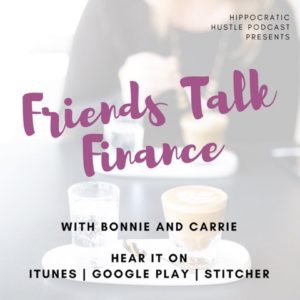Money
Platinum Sponsor: Johanna Fox Turner of Fox & Company Wealth Management
As part of the Platinum Sponsor package, sponsors get to showcase their stuff in a Q&A format. This way, you, the reader, can get to know them a little more. Johanna was a CPA for many years before she became an FA giving her a unique and complete skill set. She is our financial advisor.
 How did you decide to become a Financial Advisor?
I had been a CPA for about 25 years and got really tired of clients asking me to recommend an advisor. It’s embarrassing to recall, but I usually just said “Go see Edward Jones”. After awhile (about 25 years, I guess!) I got tired of seeing poor results and realized I had been doing our clients a disservice. So, at age 50, I passed the CFP exam, which I still believe was harder than the CPA exam. (Of course, I passed that at age 22!) I had no idea what I was getting into and had never heard of “fee-only” advisors or NAPFA.
How did you decide to work with physicians?
By answering questions on WCI and “accidentally” acquiring some really nice physician clients as a result. When the WCI forum started in January 2016, I knew it was a great opportunity because I enjoy giving advice (just ask my kids). I also didn’t know of any other FA’s who had the combination of Fee-Only CFP + CPA + experience and hardly anyone else was answering those questions on the forum. Plus, it’s a fun challenge to work with consistently “smart” people and I’ve really grown to love it.
What are the areas or action items that you’ve noticed that most clients miss?
1) Focusing on the cost of a financial advisor over the benefits to be gained
2) Not taking advantage of all retirement account opportunities
3) Emphasizing short term investing instead of having a plan for the long term
4) Not getting a LWT (Last Will & Testament) in place when the first baby is born
5) Not paying attention to cash flow – saving is important, but it’s what you spend that makes the most difference.
What’s your honest opinion – can folks really DIY? What are some caveats?
Of course, you can DIY. Starting out DIY is great because it forces you to learn a lot. The problem is, you don’t know what you don’t know. Sticking with DIY if you are making a high income without ever getting a second opinion or having a financial checkup is scary. If you’re ready to DIY and starting to learn, you should read The One Page Financial Plan by Carl Richards. In fact, reading TOPFP will help you to choose a better financial advisor when you’re ready to.
Tell us 3 things you wish your clients knew:
1) For every planning meeting we have one-on-one with you, we’re working 4 – 6 hours behind the scenes
2) I rate listening skills higher than being able to calculate future value or compound returns
3) I make a lot less money than you probably think I do!
Anything else you’d like to tell us?
I’m a sucker for giving free advice. Give me your bad luck story and I’ll try to get it fixed. I hope to see you all at the WCI conference next year!
I hope you enjoyed learning a bit more about Johanna!]]>
How did you decide to become a Financial Advisor?
I had been a CPA for about 25 years and got really tired of clients asking me to recommend an advisor. It’s embarrassing to recall, but I usually just said “Go see Edward Jones”. After awhile (about 25 years, I guess!) I got tired of seeing poor results and realized I had been doing our clients a disservice. So, at age 50, I passed the CFP exam, which I still believe was harder than the CPA exam. (Of course, I passed that at age 22!) I had no idea what I was getting into and had never heard of “fee-only” advisors or NAPFA.
How did you decide to work with physicians?
By answering questions on WCI and “accidentally” acquiring some really nice physician clients as a result. When the WCI forum started in January 2016, I knew it was a great opportunity because I enjoy giving advice (just ask my kids). I also didn’t know of any other FA’s who had the combination of Fee-Only CFP + CPA + experience and hardly anyone else was answering those questions on the forum. Plus, it’s a fun challenge to work with consistently “smart” people and I’ve really grown to love it.
What are the areas or action items that you’ve noticed that most clients miss?
1) Focusing on the cost of a financial advisor over the benefits to be gained
2) Not taking advantage of all retirement account opportunities
3) Emphasizing short term investing instead of having a plan for the long term
4) Not getting a LWT (Last Will & Testament) in place when the first baby is born
5) Not paying attention to cash flow – saving is important, but it’s what you spend that makes the most difference.
What’s your honest opinion – can folks really DIY? What are some caveats?
Of course, you can DIY. Starting out DIY is great because it forces you to learn a lot. The problem is, you don’t know what you don’t know. Sticking with DIY if you are making a high income without ever getting a second opinion or having a financial checkup is scary. If you’re ready to DIY and starting to learn, you should read The One Page Financial Plan by Carl Richards. In fact, reading TOPFP will help you to choose a better financial advisor when you’re ready to.
Tell us 3 things you wish your clients knew:
1) For every planning meeting we have one-on-one with you, we’re working 4 – 6 hours behind the scenes
2) I rate listening skills higher than being able to calculate future value or compound returns
3) I make a lot less money than you probably think I do!
Anything else you’d like to tell us?
I’m a sucker for giving free advice. Give me your bad luck story and I’ll try to get it fixed. I hope to see you all at the WCI conference next year!
I hope you enjoyed learning a bit more about Johanna!]]>
the many benefits of a solo 401(k) and the necessary conditions for opening one. So now you're convinced you need to open one. Here are answers to some common questions you might have about starting a solo 401(k).
What about the SEP-IRA?
Before you decide on starting a solo 401(K), let's discuss another retirement account.
You may have heard about the SEP-IRA (or just SEP) as another retirement account option for the very small business. The SEP-IRA has the same contribution limits as the solo-K, but contributions are made by the employER only. Additionally, SEP-IRAs do not allow for Roth contributions.
While you can contribute the same amount to a SEP as you can to a solo-K, having a SEP-IRA (since it is a pre-tax IRA) will prevent you from contributing, tax free, to a backdoor Roth IRA.
So, why would you open a SEP-IRA instead of a solo-K?
The main reason is that a SEP can be opened after the calendar year for which it applies. You can wait until your tax due date, including extensions (around October 15th), to open and fund a SEP-IRA.
For example, you have until 10/15/19 (with an extension!) to open and fund a SEP for 2018. (Even if you have already filed your 2017 return and didn’t know this rule, you still have time to amend your return and open a SEP for 2017!)
By contrast, you must open a solo-k by the end of the calendar year it is for. A very minor reason to open a SEP over a solo-K is that the paperwork to open a SEP is simpler. But don't do it just because you're lazy!
Contributions to either a Solo-K or a SEP are based on net profits adjusted by FICA taxes (Social Security + Medicare taxes). The contributions to a Solo-K and a SEP are the same if you have already made your $19k employee contribution at work. Otherwise, you can add what remains of your employee contribution, up to $19k/$25k to the maximum Solo-K contribution.
What should I consider before starting a solo 401(k)?
There are a few good solo 401(k) choices with low to no fee plan options. They differ mainly in:
- Fees: Some are free, some are not.
- Traditional vs. Roth employee contributions: Not all will offer the Roth option.
- Rollovers: Not all will accept rollovers from old IRAs, 403(b)s, 401(k)s. This is a deal breaker, in my opinion, since the ability to do this is one of the great reasons to have one.
Thankfully, someone else already did a great and thorough review on the most popular solo-K options.
Where should I open my solo-K?
Here are my top 3 picks:
- TD Ameritrade: Offers a Roth option. Has a good list of commission-free ETFs including many Vanguard ones. M has his solo-K here and I plan to open one here too.
- E-trade: Offers a Roth option. Lots of free funds.
- Fidelity: No Roth option. Lots of free funds and ETFs.
All of these accept rollovers of old IRAs, 401(k)s. Some offer loans (which I don't recommend ever doing), too.
At this time, I do not recommend opening a solo-K at Vanguard for two main reasons: they do not accept rollovers (deal breaker) and you can only invest in their investor share class funds. These funds have a higher expense ratio than their admiral class fund or ETF equivalents. They also charge a $20 fee per fund in the account annually until you reach a balance of $50K.
Final Thoughts on Starting a Solo 401(k)
For many of us, starting a solo 401(k) is the right money move.
If you're still not sure, review the impressive benefits of a solo 401(K) and determine if you qualify. But maybe you're already wanting to get started. Today is the perfect day to create that investment account.
Follow the steps outlined above and then drop us a note below to let us know how the process went. Your future self will thank you for not putting this off any longer!
Do you have a SEP or a solo-K? Are you planning on starting a solo 401(k)? Comment below!]]>
Read MoreWelcome to another installment of Interviews with Real Female Physicians. The goal of this series is to share their story so that you, the reader, may learn and be inspired from their experiences – good and bad. We all come from different backgrounds and have different situations. Some of you are married, some are not, some with kids, some with blended families. Let’s show other women that any of these can work financially! So let's introduce our next woman physician rockstar – Amanda.
Tell us about yourself:
I am a soon-to-be 40 year old Pediatric Emergency Medicine physician. I've been married for 6 years with one little girl. I am from California and my husband is from Puerto Rico. We met in medical school and after being together for 7 years, we finally got married. We waited on having kids to be “ready”, and that was a mistake because it was harder than we thought to have a baby. We spent a lot of time dealing with infertility issues. Thankfully, we had pretty good IVF coverage so while we had to pay some of it out of pocket, we were definitely lucky and it didn’t financially ruin us. We trained on both coasts and finally settled in Phoenix, AZ just last year. We had been in NYC for several years and were happy to finally leave for a better quality of life. Our hobbies, like most people, are traveling. I personally like shopping and reading when I’m not so tired! I definitely feel like I picked the right specialty. I love the kids and never know what my shift is going to bring. There’s A LOT to be said about doing shift work and leaving your work at the hospital. My advice would be to do what you love and get paid for it. I have been an attending since 2012, and my husband, a cardiothoracic surgeon, since 2016.
Did you graduate with student loans? How much & what are the interest rates?
I was lucky enough to receive full tuition reimbursement from USC for 4 years of undergrad and 1.5 yr of grad school since my mother worked there. I graduated with around 250k in debt between graduate school and medical school – a combination of federal and private loans. The private loans were at an interest rate of 7%, and those were paid off in full (approx 80k) as a gift from my mother. The remaining – I have been chiseling at it and am finally under the 100k mark at a rate of 2.1275%. My husband graduated with no loans – all paid in full by his parents. We are very lucky because our loan situation is a best case scenario compared to what other physicians face.
How fast (or not) are you paying them off?
Given my interest rate, I am taking my time paying back the loans. We would like to purchase a house in the next few years, so all of our ‘extra’ cash is going towards that. My husband is more debt averse than I am, but between the CFP and myself, we have convinced him that rushing to pay off the student loan is not financially advantageous. I am set to pay them off in 2037, however as my husband reaches his financial peak in the next few years, I anticipate being able to pay them off much sooner.
Financial aspects of kids
When did you have them?
We had our baby girl in 2016. We hope to have another, but we are not sure that will happen given my age. I also have no desire to pursue infertility treatments again, given how unsuccessful they were, and now we have a HDHP which has no infertility coverage.
Are you planning to fund their college expenses?
This is where my husband and I disagree. He wants to fully fund and I’m ok with her taking out some loans. We currently have 2 529s, a UTMA and a Coverdell ESA. There is a possibility of me joining a employer who will fund 75% of her tuition if she goes to an AZ state school. This is 17 years away, so really hard to know if AZ will be our ‘forever’ place.
What are your child care expenses?
We have a nanny and pay her $2600 monthly. I know of too many daycare nightmares and just didn’t feel comfortable with it.
Financial aspects of marriage
Are you married?
Yes we are married.
Did you get a prenuptial or postnuptial agreement?
No – we talked about it but essentially came into the marriage with nothing on both of our ends.
Do you and your husband agree on finances?
For the most part yes. We agree on needing to discuss big purchases and the need to save. (In my mind, for retirement and in his, for our daughter’s education). My husband however is less worried about having enough for retirement. He believes in enjoying his life now because you never know what is going to happen. I however tend to plan for the long-term. This is why we have a CFP because we aren’t always on the same page.
Have you experienced a financial catastrophe?
Thankfully, no.
General Finances
What’s your FI (financial independence) number?
We haven’t decided at this time.
Who handles the finances in your relationship? Are you DIY or do you have a financial advisor?
I handle the $$ and we have a CFP.
What is your net worth?
We are net positive several 100k – our only debt is my loan which is now under 6 figures. This however will change once we purchase a home.
How are you saving for FI/retirement?
We currently have 2 x 401(k)s and 2 x Roth IRAs. Previously, we had 403(b) and a 457(b). We just learned about Roth IRAs last year. We are investing only in equities with very low or no fee index funds.
One thing you wish you knew:
In the medical profession, we take an oath to do no harm. We take our profession very seriously and we make personal sacrifices to help others. We take this for granted and assume that other professionals have the same work ethic and integrity. This is how we get taken advantage of – our financial naïveté coupled with our assumption that other people are honest and have our best interest in mind.
Do you have insurance?
Yes, we have disability, life, auto and umbrella insurance.
What does FI/retirement mean to you? What does it look like?
Freedom and peace of mind. Being able to help our daughter without a second thought.
Do you give to charity? If so, where and why?
We are working on this. My husband would rather give to his immediate family or people that he personally knows who need help than a random charity where those who need it may only see a fraction of the donation.
Any parting words of wisdom?
Don’t assume the same level of competence, honesty and ethics from someone giving you financial advice that you exhibit in your profession.
And … that's a wrap! If you're interested in doing this please send me an email – I'd love to hear from you!
I love that Amanda and her husband use a CFP to help mediate their financial differences. This is definitely one of the big reasons to work with one.]]>
Read Morewhy I love the Roth IRA. I also love the Solo 401(k). If you're looking for another way to save for retirement, you want to check out these Solo 401(k) benefits.
What is a Solo 401(k)?
But first, it's important to understand what a Solo 401(k) is. Also known as an individual 401(k) or solo-K, a Solo 401(k) is a tax-sheltered retirement account for really small businesses–just you in fact. This two-part series will discuss the solo-K in the context of having a main job (w2) and having a side job with 1099 income, such as moonlighting, a blog, completing medical surveys, etc. Although, the benefits will also apply if you have 1099 income alone as well. With a really small business, you are considered to be both the employEE and employER.
What Are The Solo 401(k) Benefits?
Like all retirement accounts, it pays to really understand what you're signing up for. If you found yourself nodding along to the criteria above, you're in luck. You could start reaping all the benefits of a Solo 401(k) right away. Here's what to love about them:
Benefit 1: Ability to contribute up to $56K*
You're limited to a maximum $19K employEE contribution through your work-sponsored 401(k)/403(b). The IRS allows your employer to make additional “profit-sharing” contributions of $37k for a total of $56k. Unfortunately, while many of us have employer “matches”, we don’t work for employers with profit-sharing plans. But if you open a solo-k for your small business, you can make both employEE and employER contributions up to the current max of $56K. Keep in mind that if you have multiple work 401(k)s, you're limited to one $19K employee contribution across all accounts. But you can make “profit-sharing” contributions of 20% of net income to your solo-K even if you’ve contributed $19k as an employEE. Like regular 401(k)s you can elect pre-tax (or traditional) employee contributions or after-tax, or Roth contributions. Employer contributions are always pre-tax.
Benefit 2: Ability to hire your spouse
This is a great perk if you have a stay at home spouse who would only have access a spousal Roth IRA. Hire your spouse and s/he will be able to contribute $18K as an employee. Win-win
Benefit 3: Ability to roll over other retirement accounts into it
This is huge. As life goes on you'll change jobs at least a few times. This often leaves a trail of “orphan” 401(k’s)/403(b’s). You may have rolled over one or more of these into an IRA or two. It can get really messy. Not to mention that you're probably paying a maintenance fee for all of the accounts. Set up a solo-K and you can roll all these orphans into it, consolidating everything into one account. Less paper, less emails, and easy to keep track of your investment plan. It's retirement account decluttering at its best.
Benefit 4: Ability to contribute to a backdoor Roth IRA without being subject to the pro-rata rule
After you move all your old accounts (namely, anything with “IRA” in the name), you now have a clean slate to begin contributing to a backdoor Roth IRA. If you have any other non-zero balances in any IRA account, you’ll be subject to the pro-rata rule if you contribute to a backdoor Roth IRA, which means you’ll pay unnecessary extra taxes. Not good. You're convinced you need one now, right? I thought so.
While the Solo 401(k) benefits probably have you ready to open an account, there are a few other questions worth addressing first.
Can I open a Solo 401(k)?
Maybe or maybe not. You need earned income, typically as an independent contractor (IC). If you own an S-corp with no employees, this would come from your W2 income. For physicians, however, this is typically IC income from moonlighting, income from surveys, speaker fees, etc. If you don't have any of these now, you can find this kind of work pretty easily.
I only made $1000 of IC income. Is it worth opening a Solo-K?
Yes and yes! You need only the minimum a custodian (aka brokerage firm) requires to open a solo-K. There are no “required minimum” contributions to make to a solo-K. It is worth opening for the ability to roll over other retirement accounts into it (see #4 above).
What else do I need to know about Solo 401(k) plans?
- Once the balance in the solo-K reaches $250K you'll be subject to some compliance measures including filing form 5500 with the IRS annually.
- You need to open the solo-K by 12/31 of the calendar year but you'll have until tax day, including extensions, to fund it. So the absolute latest you can fund it is by 10/15 the following year.
Final Thoughts on Solo 401(k) Benefits
If you're feeling like you haven't arrived yet with your 1099 income, remember that you don't have to make huge contributions to start a Solo 401(k). Savings and retirement are all about options. Giving yourself access to another way to save for the future is priceless.
Read on for the second part of this topic where I'll discuss why you should choose a solo-K over a SEP-IRA and where you should open your Solo-K.
*2019 limits. If you are age 50+, you can add another $6k to your employee contributions.
Read MoreWelcome to the Q & A series where I answer your finance questions. If you have a question or a topic you'd like me to write more about, contact me.
Question:
We are worried that we are contributing “too much” to pre-tax accounts and will end up paying a lot in taxes during retirement. Should we invest in a taxable account and forgo some of the tax benefits now to diversify our portfolio?Answer:
I see some form of this question a lot. Your concern about “too much” in pre-tax accounts is valid for two main reasons – taxes and required minimum distributions (RMDs). Let's talk about taxes first with regard to pre-tax retirement accounts like the 401(k), 403(b), or pre-tax/rollover IRA. You get a tax break when you contribute to it and will owe income taxes on the amount you withdraw. So, if you contribute “too much” into these pre-tax accounts, you'll end up paying a decent amount of income taxes on withdrawal if you don't have as much money in after-tax accounts. One great way to get around this is by doing Roth Conversions. Roth Conversions refers to moving pre-tax retirement accounts into a Roth IRA. (Note: you cannot do this with an inherited IRA. Also, Roth Conversions are not the same thing as the backdoor Roth IRA conversion – confusing I know.) You'll pay taxes at your current marginal tax rate on conversion. The key is to time these conversions in low income years such as the year you stop working. Assuming you “retire” before age 70.5, the general strategy is to convert an amount each year to fill up a lower tax bracket vs. the likely much higher tax bracket you are in during your wealth accumulation years. Another important point about Roth Conversions is purchasing power. If you think about the total amount in your different accounts – pre-tax, Roth IRAs, and taxable accounts, they have different amounts of purchasing power. Basically, assuming 25% marginal tax rate for illustration purposes, if you have $100K in a pre-tax IRA and $100K in a Roth IRA – the Roth IRA actually has “more money” or more purchasing power since it won't be taxed. That $100K in the pre-tax IRA will be $75K if you withdrew the full amount, not $100K. The second part of the answer has to do with RMDs. Except for Roth IRAs, retirement accounts are subject to RMDS starting at age 70.5. This means that starting at age 70.5 you will be required to take out a minimum amount from your non-Roth IRA retirement accounts. The amount is determined by your projected distribution period and the balance of the accounts subject to RMDs on 12/31 of the previous year. The projected distribution period is based on an actuarial calculation from the IRS based only on your age. So, your medical and family medical history have no bearing. Curiously, if the sole beneficiary of these accounts is a spouse that is 10 years or more younger than you, than the distribution period will be extended, thus lowering your RMDs. One notable exception to the age 70.5 RMD rule is for 403(b)s funded before Jan 1,1987 – the RMDs for these amounts start at age 75. There is a huge penalty for not taking out your RMD – 50% of the amount you should have taken out + income taxes! The IRS made an exception to this harsh penalty in 2009 due to the down market. Having money in a taxable account is valuable due to the flexibility of being able to access it before age 59.5. There are ways to access your retirement accounts before then if you really want to, however. These topics are covered well in the following books: |
 |
|---|---|
I recently discussed and defined the terms FI, RE and FF. I'd like to introduce another term – Pre-Financial Independence or pFI.
pFI is just like it sounds. You have not reached FI, but you're at a point where you have some choices. Perhaps the most obvious choice is go part-time or take a job that will make you much happier but pays less. pFI is obviously easier to attain than the ultimate goal of FI. I just recently became familiar with this concept and Physician on FIRE discussed this concept in a blog post titled: What's Your Part-Time Number?
In my opinion, pFI is the new FI. Why? FI can seem unattainable or “too far away” for most people. pFI isn't. It may be closer than you think! There is no hard and fast rule on how to choose your pFI # but it should be at least 50%-70% of your FI number.
So, how do you calculate these numbers? The short answer is that you estimate your yearly expenses in “retirement” and multiply that by 25. Or take those yearly expenses and apply the 4% rule. The 4% rule basically states that you can withdraw 4% of your portfolio annually and most likely not run out of money. It's tough to know what your expenses will be unless you know what you are actually spending now. Keep in mind that the goal is to be done with things like paying off your mortgage and other debt at FI. And as mentioned previously, these expenses can and will change, so you may want to pad these numbers a bit.
Here are our (tentative) numbers with dates:
pFI # = $3 million by 2027 (I turn 50)
FI # = $5 million by 2037 (I turn 60)
FF # = $7 million by 2039 (I turn 62)
[ Editor's note: After this post first went live, I realized the FI & FF numbers & dates were slightly off, they have since been modified ]
You'll notice that I chose 60% of our FI number for our pFI #. These numbers probably seem really high to most of you. I figure the more the better (and safer). They are tentative since we are still working out what our actual spending is. I recently added M's accounts to YNAB so we'll have a much better idea in the next month or so. We are also still working on the plan with our FA. I'll be sure to post an update once our initial plan is finalized.
My pFI date is only 10 years away! And, we may reach that # sooner. What does my pFI look like? I'd cut down my clinical duties to 3 days a week (2.5 perhaps …). I'll be able to spend more time with my kid(s) – the first one will be around 10 then. I'll have more time to work on other endeavors like this blog. I'll be in awesome shape. I can't wait.
Have you thought about your pFI # or part-time #? Comment below!
Read Morehave to work for money. Traditionally, FI was equivalent to “retirement.” Retirement meaning you stopped working all together usually around the age of 65 or so. Think days at the golf course, river cruises in Europe, and a drink with a little umbrella in hand. Now, the definition of retirement is evolving and FI seems more fitting now since it includes the traditional definition and more.

You've arrived.
RE = Retire Early
RE is pretty self-explanatory. What counts as RE depends. In the non-physician world the famous RE folks are in their early 30s:
- Mr. Money Mustache retired at age 30
- Financial Samurai retired at 34
Early 30's would be exceedingly difficult for a traditional physician who begins attending life at age 30. I guess you'd have to be a Dr. Doogie Howser to do that. Physician on Fire is almost there as he recently announced that he is going part-time at the age of 41. I think a physician who can “retire” at age 45-50 is considered RE.
FIRE = Financial Independence, Retire Early
FIRE is a special club. You've officially arrived if you're a member. Not only can you not work for money if you don't want to but you've attained this at an age much earlier than anyone else. This is a popular goal to strive for.
FF = Financial Freedom
Isn't FF and FI the same thing? Maybe. If you're a splitter (vs. a lumper) then FF is one step beyond FI. It's FI + generous wiggle room. It's a bit naive to think you know and can predict your expenses 20 or even 30 years into the future. Things may go as planned, but often, they do not. Your wants will most certainly change. Health care costs are nebulous and completely unpredictable. A health crisis can easily eat up several 100s of thousands of dollars for things like home health care or a long-term care facility. A family member may need help and maybe you'd like to be in a position to help them and not derail your goals either.
Stay tuned for the second part of this post – how to determine your FI or FF number and more!
What's your FI number? Are you FI, RE, FF, or FIRE? Comment below!
Read MoreWelcome to another installment of Interviews with Real Female Physicians. The goal of this series is to share their story so that you, the reader, may learn and be inspired from their experiences – good and bad. We all come from different backgrounds and have different situations. Some of you are married, some are not, some with kids, some with blended families. Let’s show other women that any of these can work financially! So let's introduce our next woman physician rockstar – Liz.
Tell us about yourself:
Hi. I’m Liz. I’m an academic attending neonatologist 2 years out of fellowship training and I practice in Cincinnati, OH. 70% of my time is devoted to research. My pay is around the 25-30th percentile of other academic jobs in the area. I am married to a wonderful stay-at home-dad (SAHD) husband and we have a 3-year-old daughter with some special needs. I am happy with my specialty because I love my job, but it’s frustrating to get paid less than what most physicians make. Especially as the sole income earner. I’m doing better than general pediatricians, but I’m taking frequent call and dealing with very stressful situations. My colleagues in PICU are paid more and the discrepancy between my pay and adult intensivists is wide. If I had to do it all over again I would have gone into anesthesia or dermatology. I had the grades, board scores, etc, but neonatology had stolen my heart, so I’m in it until I burn out.
Did you graduate with student loans?
I graduated with $250,000 off student loans, most at 6.8% interest rate, that were in forbearance all through training. I do not recommend this. I didn’t know about PSLF until late in fellowship, and that was a terrible mistake. My husband also has about $60,000 in loans that are below 3%. I went to a public medical school specifically to save money. My parents were unable to contribute a dime to college or med school, so that influenced my decision. I had a great education and then went to top places for residency and fellowship. I have fully paid off my loans after a windfall I got after being hit by a car. I do not ever recommend this. I’m heading to a total knee replacement next month. But at least there’s a little silver lining. My husband’s loans are at such a low interest rate that we are slowly paying it off. 
Financial aspects of kids
When did you have them? Are you planning to fund their college expenses? What are your child care expenses?
We have one, and had a lot of difficulty having her, so I am not sure if two is in the future. I do not plan on making their 529s a priority until we are in a better situation with our finances. I did not have any money given to me for my college and I feel like it built a strong work ethic and I had no sense of entitlement. My husband became a SAHD shortly after my daughter was born, so the net cost of that is about $10,000 per year after accounting for lost income and not having to do day care. I had my heart set on public school because both my husband and I are products of public school, but with my daughter’s special needs, I’m not sure what we will do.
Financial aspects of marriage
Are you married? Did you get a prenuptial or postnuptial agreement? Do you and your husband agree on finances?
We are married, no prenup, and we agree mostly on finances and my husband stays at home. He had always wanted to do this and I am mostly happy with this arrangement. Therefore I am the sole breadwinner and it has caused no issues. My husband is the manliest man I know, but also one of the biggest male feminists I’ve met.
Have you experienced a financial catastrophe?
None except we both grew up relatively poor. We were extremely poor until just recently as my husband lost his job several times as I moved across the country to do training. 
General Finances
What’s your FI (financial independence) number?
Our FI number is around 2.5-3 million. We think living off of $100,000 per year is reasonable, which is how we reached that number. I will retire around 65, but probably won’t quit entirely for a few more years after.
Who handles the finances in your relationship? Are you DIY or do you have a financial advisor?
I mostly handle the finances. We have a great fee-only FA we found through the WCI list. She shares our same philosophies about passive investment with index funds. My partner and I both agree on this.
What is your net worth?
Probably around -$200,000 at this point, mostly due to mortgage debt.
How are you saving for FI/retirement?
We are maxing out my 403(b) and 457(b) at $18,000 per account. My work also puts 10% of my total salary into a separate retirement account. I’m using my HSA as a stealth IRA. We have one Roth IRA we’ve funded for one year. We also put part of our e-fund in a taxable account with a more conservative mix of index funds including bonds, international stocks, and total market funds.
Biggest financial failure:
Not knowing about PSLF.
One thing you wish you knew:
Get disability insurance as soon as humanly possible.

St. Lucia
Do you have insurance?
Due to my car accident issues and other health problems, I don’t qualify for any worthwhile disability insurance policies. I have ok long-term disability through work, but it’s only own occupation for 5 years. Still better than nothing. I’ve never had to use it. No life insurance yet, we do have a $1M umbrella policy.
What does FI/retirement mean to you? What does it look like?
FI/retirement means being able to work only when I want to. I’m pretty sure I’ll want to stop all clinical activities once I reach FI.
Do you give to charity? If so, where and why?
I donate monthly to Planned Parenthood and give intermittent donations to social causes I find important.
Any parting words of wisdom?
Get disability insurance as soon as possible, talk about financial goals with your partner before you get married, get a fee-only FA, use an HSA as a stealth IRA.
And finally, where can people connect with you?
You can find me on Twitter as @LizEnlowMD or Facebook Elizabeth Marie.
And … that's a wrap! If you're interested in doing this please send me an email – I'd love to hear from you!
I hope you enjoyed reading Liz' story. Her story is not only inspiring but shows that FI is possible even when life throws some unexpected wrenches along the way.]]>
Read Moreaunched a blog series where I interview other women physicians about their finances. This week, Chief Mom Officer interviews me as part of her “Six Figure Breadwinning Moms” series:
What’s the top three pieces of advice you’d have for someone just starting out in the workforce, struggling with their career, or just looking to improve how they handle their money?
- Live within your means. When your income increases, don’t increase your lifestyle in proportion. You lived on lesser income before, you can still do it.
- Learn the basics of personal finance and read at least one financial book a year. No one will care more about your money than you.
- The more money you have saved and invested wisely, the more choices you will have in life now and later.
Read the full interview here.

I also want to let you all know that Dr. Carrie Reynolds and I launched our bi-monthly podcast where we discuss all things finances. Dr. Carrie Reynolds @ Hippocratic Hustle (where she interviews female docs who are up to awesome things). You can find her podcast on iTunes. Our inaugural episode is here or search for “Hippocratic Hustle” on iTunes or you favorite podcast app. We discuss finance topics in a conversational way where we weave in our own experiences. We hope you enjoy it! We definitely are having recording them :).]]>
Read More
















